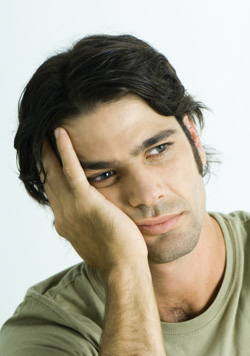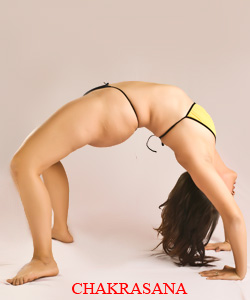Depression: causes, criteria of evaluation and recommended remedies from the perspective of naturist medicine and YOGA practice
by Dr. Cristian Boerescu
 Statistics show that one in four women and one in ten men are touched at least once during their lifetime by this suffering. In Romania it is estimated that over 2 million people are affected by depression, due to their inability to adapt to social hardship. Particularly during periods marked by difficulties (unemployment, sickness, exams, divorce, change of workplace, conjugal quarrels, deaths), many people are gripped by temporary feelings of sadness, dissatisfaction, deterrence, apathy, indisposition, pessimism, and may sometimes even reach up to suicidal ideas. If a person cannot overcome such negative status for two weeks, they could suffer of some form of depression.
Statistics show that one in four women and one in ten men are touched at least once during their lifetime by this suffering. In Romania it is estimated that over 2 million people are affected by depression, due to their inability to adapt to social hardship. Particularly during periods marked by difficulties (unemployment, sickness, exams, divorce, change of workplace, conjugal quarrels, deaths), many people are gripped by temporary feelings of sadness, dissatisfaction, deterrence, apathy, indisposition, pessimism, and may sometimes even reach up to suicidal ideas. If a person cannot overcome such negative status for two weeks, they could suffer of some form of depression.
Depression can occur at any age. Specialists consider that half the people who have gone through an episode of major depression will go through another one at a certain period of time. Many people are tempted to seek refuge in alcohol, tobacco or drugs. These can temporarily improve their state of mind, but the “bliss” ends soon, to be replaced by a much more wrenching agony than the initial depression. The nerve cells are negatively influenced by the action of tobacco and drugs, ending up being weakened, exhausted, and thus the depressive condition becomes chronic.
Not every ailment is depression. Anyone can feel at one time a state of listlessness, but this does not necessarily mean that we suffer from clinical depression. No one is immune to occasional bad states and we are all sad and discouraged when we have a loss. However, if these feelings persist or intensify over time, then it is a question of serious imbalance.
The Montgomery Asberg scale indicates several criteria for evaluation of depression:
– total lack of interest towards almost any task that was before a pleasure, plus an excruciatingly feeling of emptiness inside and lethargy;
– state of deep inner sadness – the person concerned feels deprived of aid and lacks hope;
– irascibility;
– feeling of futility;
– inability to concentrate, to think and make decisions;
– pessimistic thoughts, ideas of guilt and inferiority complexes, self censorship and remorse towards acts considered reprehensible or to “sins”;
– ideas and plans for suicide preparation; the depressives come to believe wrongly that life is no longer worth living, and oftentimes their suicide attempts succeed;
– reduction of the duration and depth of sleep;
– visible changes of appetite;
– lack of energy, asthenia, fatigue, lassitude (feeling of tiredness, boredom).
 For many victims of depression, these physical and mental states continue day and night, seem endless and often can not be eased by either happy events or good news. Some people are so dominated by the feeling of despair that they cannot gather forces – however much people around would encourage them (family, friends, colleagues). The depressive people do not follow any advice and refuse the help of the ones around them because they feel so deprived of hope that everything seems meaningless to them.
For many victims of depression, these physical and mental states continue day and night, seem endless and often can not be eased by either happy events or good news. Some people are so dominated by the feeling of despair that they cannot gather forces – however much people around would encourage them (family, friends, colleagues). The depressive people do not follow any advice and refuse the help of the ones around them because they feel so deprived of hope that everything seems meaningless to them.
Mental or neurological illness?
Doctors still do not know the exact mechanism that leads to the emergence of depression. Psychiatry has long considered it as a mental illness which originated in the suppression of painful emotions, like anger and sadness. Today it is known that genetic factors are also involved, and recent research indicates the presence of some imbalances at the level of endocrine hormones (cortisone) and of the brain neurotransmitters (serotonin, norepinephrine).
However, the researchers do not know whether these imbalances cause depression or if they occur as a result of the disease. The medication that is administered (serotonin inhibitors, tricyclic antidepressants, lithium, MAO) quickly block biochemical phenomena of depression, but in the long run, their efficiency is low, the allopath doctors themselves also recommend psychotherapeutic methods.
Diet
Doctor Elsan Haas, director of “Preventive Medical Center of Marine” recommends that, in his work “A diet for all seasons”, that the patients with depression should keep a purifying diet plan for 2-3 weeks. During this period they should avoid the consumption of milk, sugar, meat, canned foods, pasta, all to be replaced with fresh fruit and vegetables well ripened by the sun. These lead to “a rebalancing and a better stability of the psyche”.
Dr. Brigitte Mars, specialist in phytotherapy and nutrition (Boulder, Colorado) stresses the importance of liver purification in the treatment of patients suffering from depression because research found that their livers are heavy and blocked. Therefore, she recommends avoiding fats – butter, margarine, meat products, as well as “snack foods”.
Another expert on depression, Low Dog Tierona, shows that the vitamins of Group B (and especially B12) can produce wonders in its healing, but has serious reservations in their administration under pill form. More efficient is the assimilation of vitamins directly from food, while observing a proper diet.
 We recommend that your first meal on a daily basis to be a Kolath breakfast, which is rich in B vitamins.
We recommend that your first meal on a daily basis to be a Kolath breakfast, which is rich in B vitamins.
In the Mini encyclopedia of Romanian naturist medicine, by yoga teacher Gregorian Bivolaru, we find the following recommendations, which put into practice have given very good results in the case of many patients:
1) cereals: wheat 200gr/day, buckwheat 100gr/day;
2) vegetables: onions 1-2/ day, leek 100gr, celery 100gr;
3) fruit: apricots, hazelnuts, walnuts 100gr/day, blackcurrant 75gr, pollen 30gr/day.
Phytotherapy
In Western Europe, the plant named “Saint John” has an old tradition of use as antidepressant, research showing that it behaves like MAO antidepressants medication, but without adverse effects.
The specialist in phytotherapy Low Dog tincture recommends the tincture of valerian 3 to 5 ml 2/3 times a day, in case of neurotic symptoms, irritability, and restlessness.
Purple passion flower (maypop, Passiflora incarnata) – has an effect similar to MAO inhibition, and relieves the feeling of anxiety. Associated with chamomile, it soothes the nervous and digestive manifestations.
Oats coffee, 2-3 cups per day, has the effect of calming the nervous system, but also of refreshing.
Dr. Mars recommends the tincture of Gingko Biloba (in the pharmacy you can find Tanakan – solution, product that is released and compensated on the recipe).
In our flora (we quote from Mini encyclopedia of Romanian naturist medicine, by yoga teacher Gregorian Bivolaru), the most efficient plants are:
1) Balsam herb, bible leaf (Tanacetum balsamita)…100gr
2) Herb Bennet (Geum urbanum)…100gr
3) Valerian (Valeriana officinalis …100gr
4) Lemon balm (Melissa officinalis)…100gr
5) Motherwort (Leonurus cardiac) …100gr
6) Ranvolfia …100gr
7) St John’s wort (Hypericum perforatum)…100gr
8) Rosemary (Rosmarinus officinalis) …100gr
9) Sage (Salvia officinalis) …100gr
10) Basil (Ocimum basilicum)… 100gr
 Finely grind the plants with an electric grinder, mix them in the indicated quantities, and take one teaspoon (5 grams) 4 times a day from each consequent blend of plant. Keep them sublingual for 15 minutes, and then swallow them with mineral water.
Finely grind the plants with an electric grinder, mix them in the indicated quantities, and take one teaspoon (5 grams) 4 times a day from each consequent blend of plant. Keep them sublingual for 15 minutes, and then swallow them with mineral water.
These mixtures of plants can be used for aromatic baths: 200 gr. mixture (powder) macerated for24 hours in 500 ml water, added to the warm water in the tub. Dr. Mars suggests adding a few drops of lavender or jasmine oil to a warm bath with herbs.
YOGA Exercises
YOGA techniques stimulate the production of endorphins and raise the level of serotonin in the blood, which explains the pleasantly euphoric state that appears at the end of a session of YOGA gymnastics. The American psychiatrist Mark Gold says: “It is impossible to suffer from depression when you practice YOGA”. YOGA helps to regulate the endocrine system and induces in the mind and a state of inner peace.
The YOGA teacher Barbara Kaplan, from Oakland California, shows that in the case of depression there is an energetic blockage in the heart area (ANAHATHA CHAKRA), the persons concerned being incapable to open their heart. They even have a bent body position, with sagging shoulders and a stuffy chest that maintains the crisis and aggravates the state. (Such observations are confirmed even by psychoanalysis. The depressives are aware of this emotional issue; they can not overcome it and suffer because of it). She recommends body postures that open the chest area: ARDHA-CHANDRASANA (Crescent posture), BHUJANGASANA (Cobra’s posture), CHAKRASANA (bridge in lifting), and SHALABASANA (grasshopper posture).
Koplan – YOGA therapist with the Phoenix Rising Foundation, USA – recommends inversed postures: SARVANGASANA (candle posture), SHIRSHASANA (sitting on the head posture), because the accumulation of blood to the head adjusts the sleep and brain processes. He draws attention, however, that these exercises must be learned and practiced under the guidance of an instructor. “YOGA eliminates the state of apathy and lack of interest by specific exercises – ASANAS. Exercises that push the chest forward awake the ability to give and receive love. The postures of the hero (VIRASANA) or Sun Salute (SURYA NAMASKARA) help the elimination of anger and to be aware of personal power. “
Miraculous methods without drugs
Cheri Huber, the author of the book Depression seen as opportunity of spiritual practice, recommends that we ask ourselves the following question during depressive states: “How can I take care of myself when I feel like this?”, and then we apply the same treatment we apply to the beloved person. The author even suggests a party in honor of depression: “Bake a small black cake for you. Do not add anything to help it grow or to be tasty. Paint a giant, dark, depressive painting. You will see this way the negative state that you indulge yourself into. All these troubles that seem true obstacles in life may be, in fact, impulses for us to do better. “
Dr. Patrick Miller, in the Book of Practice Belief, recommends: “Return to nature. Activate your body, preferably through play. Replace the feeling of guilt, or other negative belief,s with humility and confidence. Ask God for help.”
Tierona Low Dog indicates walks in a garden, contemplation of the sunset, or of the smile of a child. Dr. Mars underlines the importance of exposing the fully nude body to sunlight for maintaining the state of happiness. Light acts at the level of pineal gland, stimulating thus the production of melatonin, a hormone that regulates sleep and inner disposition. During the winter months, when the Sun barely shows itself, many people suffer from depressions and some seasonal affective dysfunctions, Dr. Mars says, suggesting exposure of 20 minutes/day outdoors and replacing incandescent light bulbs (which emit a slightly yellowish light) with energy saving lamps emitting white light (halogen lamps) – total spectrum.
Do not forget laughter therapy! Buy yourself joke books, funny magazines, and video games. Close yourself inside your house and watch a few good comedies. Play funny pranks to your friends and fellows, enjoy yourself and laugh out loud.
Article taken from YOGA MAGAZIN no. 11
yogaesoteric
29 November 2011
Also available in:
 Română
Română
